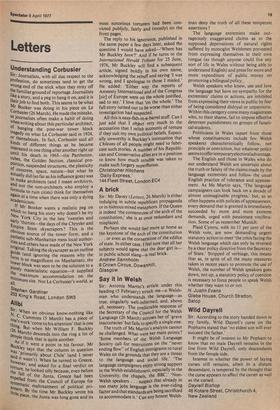Alibi
Sir: When an obvious know-nothing like C. Cummins (5 March) has a piece of ones work 'come to his attention' that is one sing. But when Mr William F. Buckley (6 March) descends into the ring a lot of People think that is quite another. As if it were a point in his favour, Mr B„ uckley says that the column in question Was 'primarily about Chile' (and I never Said it wasn't). When he turned to Greece, however, and asked for a final verdict on torture, he looked silly because, even before the fall of the Junta, Greece had been expelled from the Council of Europe for s
Ysternatic maltreatment of political prisoners. By the time Mr Buckley wrote his little piece, the Junta was long gone and its most notorious torturers had been convicted publicly, fairly and (mostly) on the front pages.
The reply to his ignorance, published in the same paper a few days later, asked the question I would have asked—'Wherc has Mr Buckley been?' And if he turns to the International Herald Tribune for 25 June, 1976, Mr Buckley will find a subsequent article, signed boldly in his own name, acknowledging the rebuff and saying 'I was wrong, and I apologise to those I misled.' He added : 'Either way the reports of Amnesty International and of the Congress [sic] of Europe were on the whole justified, sad to say.' I love that 'on the whole.' The full story turned out to be worse than either investigation had suspected. All this is easy-fish-in-a-barrel stuff. Can I just add that I object very much to the accusation that I relish accounts of' torture if they suit my own political beliefs. Especially unworthy is Buckley's insinuation that Chileans of all people might need to fabricate such stories. A number of his Republican and Conservative allies ate in a position to know how much trouble was taken to make such forgery superfluous.
Christopher Hitch ens 'Daily Express,' 144 Fleet Street, London EC4
































 Previous page
Previous page